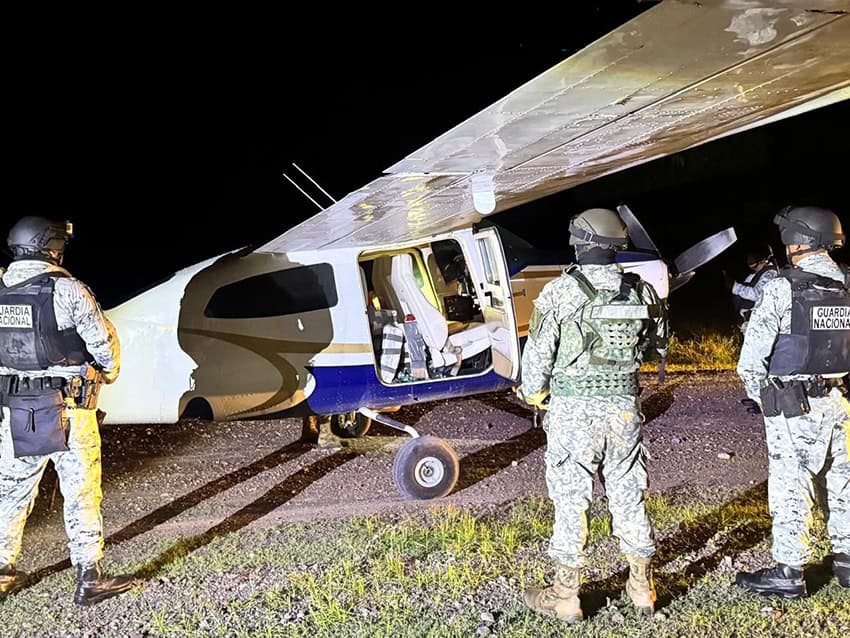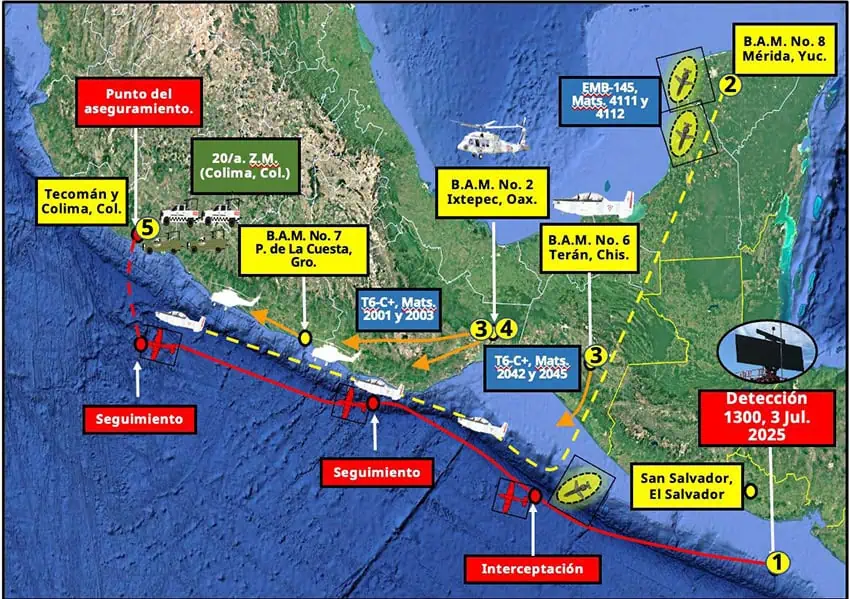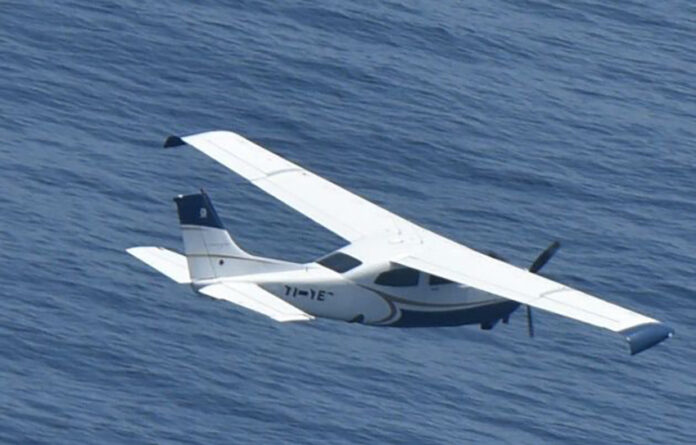An apparently innocent mistake escalated into something of an international incident on Wednesday.
Security Minister Omar García Harfuch’s declaration on Tuesday that a plane carrying more than 400 kilograms of cocaine came to Mexico from El Salvador provoked a blunt response from Salvadoran President Nayib Bukele, who denied that the aircraft “touched Salvadoran territory.”

García Harfuch clarified on Wednesday that Mexican authorities first detected the plane 200 kilometers south of the “level” of San Salvador, meaning that the aircraft was flying above the Pacific Ocean off the coast of El Salvador.
That information was also included in a Security Ministry statement issued on July 4, but at President Claudia Sheinbaum’s Tuesday morning press conference, the security minister — in an apparent case of misspeaking — said that the plane came from El Salvador.
“In Tecomán, Colima, due to surveillance and protection operations of Mexican airspace, personnel from the National Center for the Surveillance and Protection of Airspace [Cenavi] detected an aircraft coming from El Salvador that was transporting 428 kilograms of cocaine,” García Harfuch said.
He noted that three people were arrested after the light aircraft landed in Tecomán, and told reporters that the value of the cocaine on the plane was 96 million pesos (US $5.15 million).
On Wednesday, Bukele took to social media to refute García Harfuch’s declaration that the plane came from El Salvador.
“FALSE,” he wrote on X in a post that included footage of the security minister speaking at Sheinbaum’s press conference on Tuesday and a map that showed that the plane in question passed El Salvador a considerable distance off the coast of the small Central American country.
Bukele said that at 1 p.m. on July 3, Costa Rica reported the presence of a “suspicious” aircraft northwest of its territory and consequently activated a regional alert through APAN, “a Central American air safety network.”
“According to their own report, the flight path of the light aircraft entered Costa Rica, briefly disappeared from radar, and then reappeared, exiting toward the Pacific,” he wrote.
“Our radars did not register any aerial contact within our airspace. In the attached image, the route is clearly visible: far south of El Salvador and Nicaragua, with no proximity to national airspace,” Bukele said.
He said that the flight path of the aircraft was also confirmed by the United States’ Joint Interagency Task Force South in Key West, Florida.

“Their report is clear: the aircraft flew over the Pacific Ocean and never touched Salvadoran territory,” Bukele wrote.
He subsequently provided what he called information that “no media outlet or official source has published: the names and nationalities of the crew members.”
In his X post, Bukele highlighted that the three people who were arrested in Colima are all Mexican.
He then declared that El Salvador doesn’t protect criminals or tolerate drug trafficking.
“We didn’t do it before, we won’t do it now. Nor will we allow attempts to implicate us in operations that don’t concern us,” Bukele said.
“… We demand an immediate clarification and rectification from the Mexican government with respect to the declarations made by its [Security] Minister Omar García Harfuch,” he wrote.
The Salvadoran president also said his government would recall its ambassador in Mexico for consultations on “this situation.”
Later on Wednesday, García Harfuch provided the clarification Bukele sought, writing on X that Cenavi detected the plane 200 kilometers south of the “level” of San Salvador and ordered planes from various military air bases to “intercept the clandestine flight path toward probable landing sites.”
He noted that the light aircraft landed on a “clandestine” airstrip in Tecomán and that National Guard personnel and soldiers subsequently detained three people and seized 427.65 kilograms of cocaine as well as the plane.
“Indeed, those detained are of Mexican nationality,” García Harfuch wrote, noting that they are “being processed for various crimes.”
“We reiterate our respect and appreciation for the people of El Salvador,” he wrote. “These actions demonstrate the commitment of the government of Mexico to combat organized crime.”
Bukele was only half-satisfied with García Harfuch’s response. He reposted the security minister’s post to his X account, but also directed a new message to him.
“Mr. Secretary, with all due respect, the information you share this time, while true, fails to mention that there is no evidence that the aircraft came from El Salvador,” Bukele wrote.
“On the contrary, it was neither a Salvadoran aircraft nor did it have a Salvadoran crew. We can grant you the benefit of the doubt and understand that what was expressed in the press conference may have been a misunderstanding, but we expect a more precise clarification. It must be absolutely clear that there is not the slightest indication that this aircraft departed from our country, nor that anyone in El Salvador is linked to that drug shipment,” he wrote.
As of 3 p.m. Thursday, García Harfuch hadn’t made any additional comment on the matter.
Mexico News Daily
